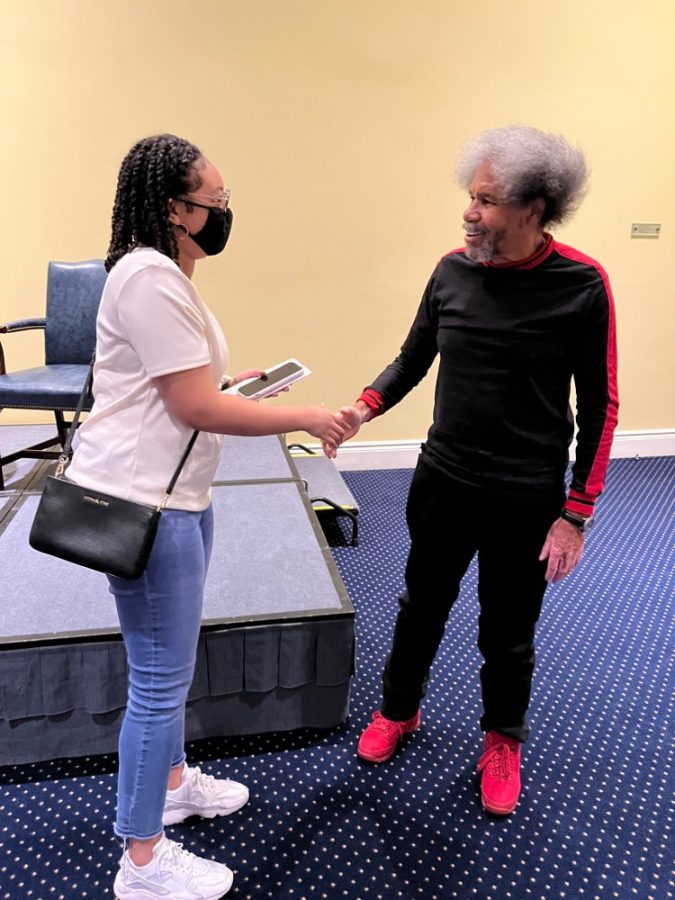Albert Woodfox tells his truth at recent WUmester event
Sophomore Aja Carter and activist Albert Woodfox shake hands at WUmester’s spring event. This event was held on Mar. 1, 2022.
In furthering the topic of truth this spring, WUmester held an event featuring Albert Woodfox on Mar. 1. Albert Woodfox,an activist and member of the Black Panther Party, was wrongfully convicted of murder in 1973 and held in Louisianna State Penatentary for 43 years.
The occasion was held at the Bradbury Thompson Alumni Center and was filled with students, parents and faculty alike. During the event, Woodfox was interviewed by Eugene Williams, former KTWU executive director and member of the Strategic Leadership Academy.
To begin, Woodfox went into detail about his childhood and what it was like living in New Orleans. He described himself as a petty criminal during his teenage years, committing robberies to help feed his family.
“Living in poverty … you fall victim to survival,” Woodfox said. “Most people, that’s what they did. They survived whatever way they could.”
Later, Woodfox stated that this was his greatest crime: stealing from people within his community. He continues to give back and tell his story as a way to make up for it.
Throughout the interview, Woodfox explained his experience in solitary, which he expounds upon in his book, “Solitary: Unbroken by Four Decades in Solitary Confinement. My Story of Transformation and Hope.” Woodfox was held in a 9×6 cell for 43 years. Each day he would get one hour outside his cell. Some days, the guards would leave him there for up to 26 hours if they were behind schedule.
“I’m very spiritual and I believe that my ancestors had placed their hands upon me to do this,” Woodfox said. “How else could I survive 43 years in solitary?”
Though he was under horrible circumstances in prison, Woodfox was able to fight for the rights of himself and other prisoners. He challenged the system to distinguish between what’s human and inhuman. One of the ways he did this was by refusing to do unnecessary strip searches. He also encouraged his prison mates, teaching them their rights and even how to read.
Overall, the event was a great addition to WUmesters topic of truth. Woodfox spent four decades in prison for a crime he did not commit. Time he could have spent free was taken from him, because the truth hadn’t been told.
“I’ve always looked at a certain thing like truth as being abstract. […] One man’s truth is another man’s human nature.”
“I wouldn’t change a thing about the experiences that I’ve had because it allowed me to have the humanity and be the advocate I am now,” Woodfox said.
Edited by: Glorianna Noland, Ellie Walker
Your donation will support the student journalists of Washburn University. Your contribution will allow us to purchase equipment and cover our annual website hosting costs.










Thomas • Mar 9, 2022 at 9:49 pm
Great article. I can only imagine how it would feel to be stripped away from society for a crime you did not commit.